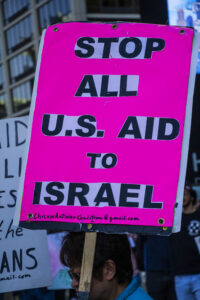The issue of free speech on U.S. college campuses has reappeared big time with the Israel-Palestinian war.
Ross Stevens, a big donor to the University of Pennsylvania, is asking for the return of his $100 million donation unless the university fires its president Liz Magill. Stevens got angry when Magill answered a question before a congressional committee in which she did not unequivocally state that calling for the genocide of Jews would necessarily violate the school’s code of conduct on bullying and harassment. Jonathan Greenblatt, the CEO of the Anti-Defamation League, described Magill’s testimony as “catastrophic and clarifying.”
Meanwhile, large donors to other major universities are terminating their support because of the failure of school administrators to condemn, punish, or suppress any speech on campus that does not unequivocally side with the Israeli government. Donors claim that permitting anyone on campus to openly sympathize or side with Palestinians or issue any critique of the Israeli government automatically means that the school is “anti-Semitic.”

Licensed under the Creative Commons Attribution-Share Alike 2.0 Generic license.
Not surprisingly, mainstream commentators are framing the issue in the context of “free speech.” Actually, except as noted below, the controversy has nothing to do with the right of freedom of speech.
As the owners of their establishments, colleges and universities have the right to set whatever policies they want on their campuses. If they want to prohibit students and teachers, for example, from questioning the Holocaust, they have the right to do that. By the same token, if they decide to have a course taught that questions the Holocaust, they have that right as well.
If students don’t like the school’s policy, they don’t have to attend that school. They can go elsewhere. By the same token, if donors don’t like a particular policy of the school, they can take their money elsewhere.
This is the way that things are handled in a free society. It’s not always an easy issue for school administrators. On the one hand, they might see university life as one of being exposed to all sorts of ideas, concepts, positions, policies, and philosophies, including some that people might find offensive, in order to have students figure things out for themselves. On the other hand, school administrators might not want the students to be exposed to concepts that are considered to violate moral or ethical principles of the school. While the issues might present school administrators with difficult choices, the idea is that it’s best to have them sorted out and resolved within the voluntary actions of the participants.
But a question naturally arises, one that no one in the mainstream press asks: Why is this controversy any business of Congress? Why are university presidents being hauled into Congress and forced to explain or justify their policies or practices with respect to the Israel-Palestinian war or, for that matter, any other issue? Indeed, what authorizes the House Education and Workforce Committee to launch an investigation “with full subpoena power” into Harvard, MIT, and the University of Pennsylvania?
We are now talking about real censorship and real infringements on the fundamental, God-given rights of freedom of speech and private property. How a university runs its affairs is no more the business of Congress (or the rest of the federal government) than how a church runs its affairs.
What gives Congress the authority to censor, insult, abuse, humiliate, question, and pressure college presidents on any campus policy? The answer is that such authority comes from the schools’ decision to go on the government dole through the receipt of taxpayer-funded grants and subsidies from either the state or federal governments. Thus, the dole gives Congress the authority to control, manage, and supervise these institutions of higher learning.
This is what all too many colleges and universities are loath to acknowledge — that when they went on the dole, the piper ended up calling the tune. By accepting the government’s money, the schools traded away their freedom and independence for a mess of pottage.
I will guarantee you one thing: Those members of Congress won’t be subpoenaing the administrators of Hillsdale College in Michigan to appear before them to answer questions about their on-campus policies regarding Israel-Palestine or any other issue. That’s because Congress has no jurisdiction over Hillsdale College because Hillsdale is not on the government dole. By not going on the dole, Hillsdale is totally independent of any governmental control or interference with its operations.
Many years ago, the federal government, angry over Hillsdale’s independence, announced that it had the authority to control Hillsdale’s department of admissions because its students received government grants or loans. Hillsdale knew what would happen if it let the camel stick its nose into the tent. Therefore, the school prohibited students from receiving any government assistance and raised the money to help them through voluntary donations. Hillsdale, to the government’s extreme chagrin, remained totally independent of government control.
Whatever policy colleges and universities adopt with respect to the Israel-Palestinian war is not censorship or infringement on freedom of speech. The policies adopted are the natural result of the give-and-take in which private institutions and private people engage in the context of a free society.
It is only government that censors and infringes on freedom of speech and private property. America would be better off with a complete termination of all state and federal grants to colleges and universities and their students, which would thereby enable educational liberty to flourish in the realm of higher education.



